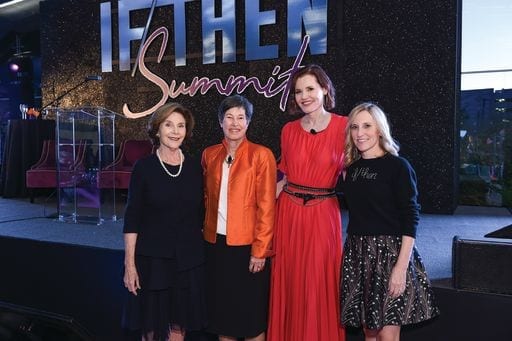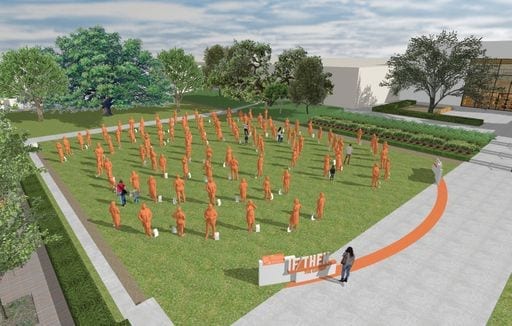A $25 MILLION INITIATIVE AIMS TO CHANGE CONVENTIONAL THINKING ABOUT WOMEN AND STEM.
In the art world, women are trying to correct the canon. In business, break the glass ceiling. And what about STEM, the science, technology, engineering, and math fields? There the problem is underrepresentation with women comprising only 29 percent of those in the profession. Dallas-based Lyda Hill Philanthropies is betting $25 million that they can close the gender gap by encouraging young women to think differently about careers in STEM.
Girls cite a lack of role models as a reason for not going into STEM, and half of the women familiar with The X-Files cite Dana Scully, the TV show’s FBI/physician character, as increasing their interest in STEM. (There’s even a name for the phenomenon: “The Scully Effect.”)
The problem is clear: Girls are not “seeing cool women doing cool jobs,” as Nicole Small, the CEO of Lyda Hill Philanthropies and co-founder of the IF/THEN initiative, says. To change that, Lyda Hill Philanthropies and the American Association for the Advancement of Science have selected 125 STEM “ambassadors” from an applicant pool of 700 to demonstrate just how fun and interesting STEM can be.
Countering the cliché of the scientist as dullard slaving for long, boring hours in a lab, AAAS IF/THEN ambassadors include a shark researcher working in the South Pacific, an aviation maintenance technician climbing on planes for Southwest Airlines, and a set designer working on the backdrop at Taylor Swift concerts. If girls think science is unrelated to how they spend their days, a data scientist at Spotify and a co-developer of Fortnite prove otherwise. Even when a scientist’s interests might seem recondite—Ph.D. student Earyn McGee studies three species of lizards in the Chiricahua Mountains— her interface with the public is not. McGee’s #FindThatLizard is a super-popular game on Instagram and Twitter.
The ambassadors are intentionally a multi-ethnic, diverse group at all stages of their careers, simultaneously impressive and familiar. Can you have blue hair and be a scientist? Wear a hijab and be a scientist? Yes and yes.
“This is what a scientist looks like,” AAAS IF/THEN ambassador Danielle Twum, a cancer immunologist and field application scientist at California’s Levitas Bio, posted on her Twitter feed in 2019. The accompanying photos show a lab-coated African-American woman with a shock of bleached hair, purple lipstick and purple vinyl gloves, alternately laughing and mugging for the camera.

Ambassadors are connecting with girls where you might expect—in classrooms and science education settings—but that’s merely the tip of the iceberg. IF/THEN has 35 major coalition partners who are helping get the word out. There are the usual suspects—like the Girl Scouts, Teach for America, and National Geographic—but also, as Small says, “less obvious partners,” like Project Runway (who devoted an episode last year to gaming and STEM in fashion) and U.S. Soccer (who are pledging to hire more female STEM professionals).
“We are going to girls where they are,” says Small, whether that is at soccer games, engaged with fashion, dreaming about the Olympics, on their phones, or in front of screens.
To this end, IF/THEN is co-producing “Fast Forward Girls,” a YouTube series with GoldieBlox; a 2020 Tokyo Olympics video series with NBC; and Mission Unstoppable, a CBS show with Litton Entertainment and executive producers Miranda Cosgrove and Geena Davis.
On each installment of “Fast Forward Girls,” a different girl meets two female scientists, then picks which one she wants as a mentor. In one episode—viewed by over 750,000 people—11-year-old YouTube vlogger Bailey Ballinger burbles with excitement as she meets a neurosurgeon who explains craniotomies, then teaches Ballinger how to drill into a fake skull. Later in the episode, a professor who specializes in stroke rehabilitation helps a giggling Ballinger attach an EEG cap to a man so he can engage in virtual reality physical therapy. Meanwhile, Mission Unstoppable is a fastpaced 30 minutes geared to 13- to 16-year-old girls that shows everything from a woman making ice cream in 90 seconds to a woman driving robots on Mars. With NBC News Learn and NBC Sports, IF/THEN is airing 10 videos of “the STEM stars behind the 2020 Tokyo athletes,” as Small puts it, including a Paralympic athlete and the scientist for her prosthetic leg.
Other IF/THEN efforts include a call to science museums around the country to put more images of women on walls, and a Dallas-based exhibit of life-sized 3-D printed statues of AAAS IF/THEN ambassadors, the largest collection of statues of women ever shown at one time, an effort inspired by a recent study of 10 major American cities that found fewer than six statues of historical women in public spaces.
At an October 2019 IF/THEN summit at Dallas’s Perot Museum of Nature and Science, ambassadors were trained to do outreach. Experts coached them in public engagement, social media and communications as ambassadors scribbled notes on folders with “Steminist” stickers. In Dallas, the ambassadors also had a chance to meet each other, young girls, Laura Bush, Geena Davis, and Lyda Hill herself. Over the course of the sessions, Hill pledged even more money—$10,000 per ambassador—for those ready to spearhead their own outreach efforts.

Long before she became an ambassador, J’Tia Hart, who is the program lead in the strategic security sciences division at Argonne National Laboratory, was involved in outreach to girls and African-Americans, simply because “I see myself in them. It’s a passion of mine.” Now her previously unpaid work has IF/THEN funding. “I am all about excitement,” says Hart. “That’s my wheelhouse. In STEM, we downplay how cool and awesome things are because we think people might not understand.”
On a recent day, Hart introduced 150 eighth-grade girls to her career journey, one that started in college, when she had the opportunity to ride a nuclear submarine and felt both the power and danger of that energy source. The experience led her to become a nuclear engineer who helps to shape responsible government policy. Behind all these imaginative efforts is Lyda Hill herself, the founder of Lyda Hill Philanthropies, a former businesswoman and venture capitalist, now full-time philanthropist, who took The Giving Pledge to donate the majority of her wealth to philanthropic causes. Her focus is on gifts to science and nature nonprofits that will make the world a better place. Hill believes “science is the answer to most major issues,” and, as such, has invested in hospitals, medical centers, science museums, research and public policy organizations, natural landmarks, nature preservation organizations, schools, volunteer centers, and more. Her current focus on girls and STEM isn’t merely about perception, however. It’s about genuine transformation. Summarizing the raison d’etre for the entire initiative, Hill says, “We firmly believe that IF we support a woman in STEM, THEN she can change the world.”
By Debra Spark

